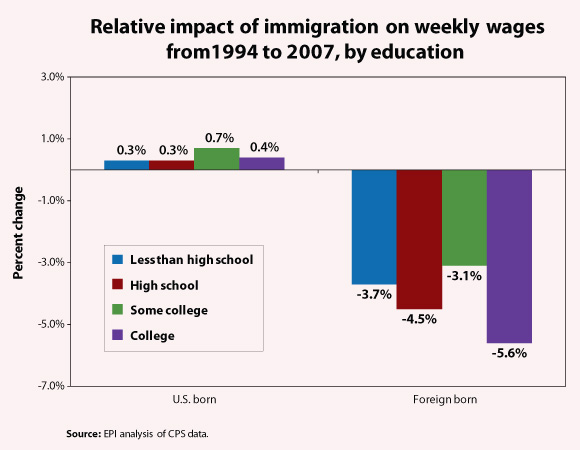By Anna Turner
There is broad agreement among economists that immigration has a small but positive impact on the average wages of workers born in the United States: while new immigrant workers add to the labor supply, they also consume goods and services, which creates more jobs. However, economists remain divided over the impact of immigration on specific groups of U.S. workers, particularly those with low levels of education. In the new paper Immigration and Wages, Economist Heidi Shierholz finds that recent immigration has boosted relative weekly wages for native-born workers at all levels of education, including those with less than a high-school education.

The figure compares how immigration between 1994 and 2007 affected weekly wages of U.S. workers relative to foreign-born workers and of foreign-born workers relative to US-born workers at different levels of education. It shows that immigration not only has small positive effects on relative wages for U.S. natives overall, but it has positive effects on relative wages of U.S. workers in all education categories. At the same time, it shows that immigration does have strong negative effects on the relative wages of earlier immigrants. U.S. workers with less than a high school degree are essentially unaffected, showing a relative wage increase of 0.3%, or $1.58 per week, while their foreign-born counterparts show a nontrivial decline of 3.7% (a decrease of $15.71 per week). These findings challenge the popular assumption that ‘one worker’s job gain is another worker’s job loss.’ Immigrant workers are generally not perfect substitutes for U.S.-born workers, even when they have the same educational attainment. On the other hand, earlier immigrant workers are likely to have similar language skills or experiences, which could make them more vulnerable to competition from new immigrants. The paper finds little evidence that recent immigration has had sizeable adverse effects on the wages of U.S.-born workers, and instead finds that any negative effects of new immigration over this period were felt largely by those workers who are the most substitutable for new immigrants – earlier immigrants.
